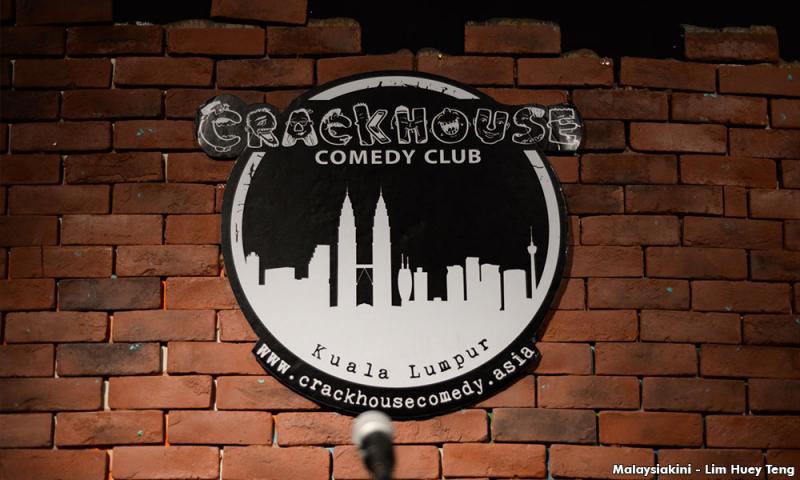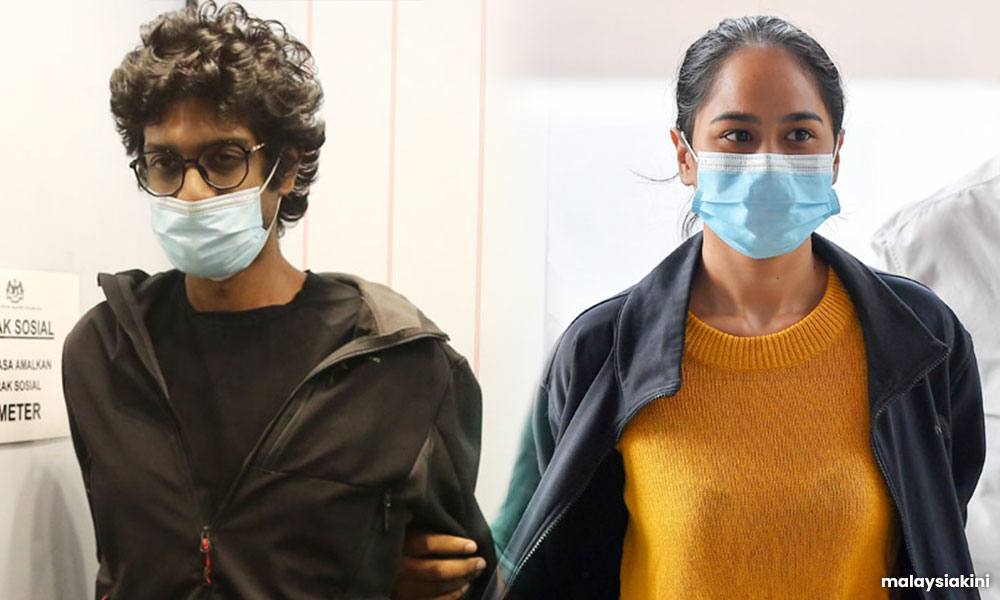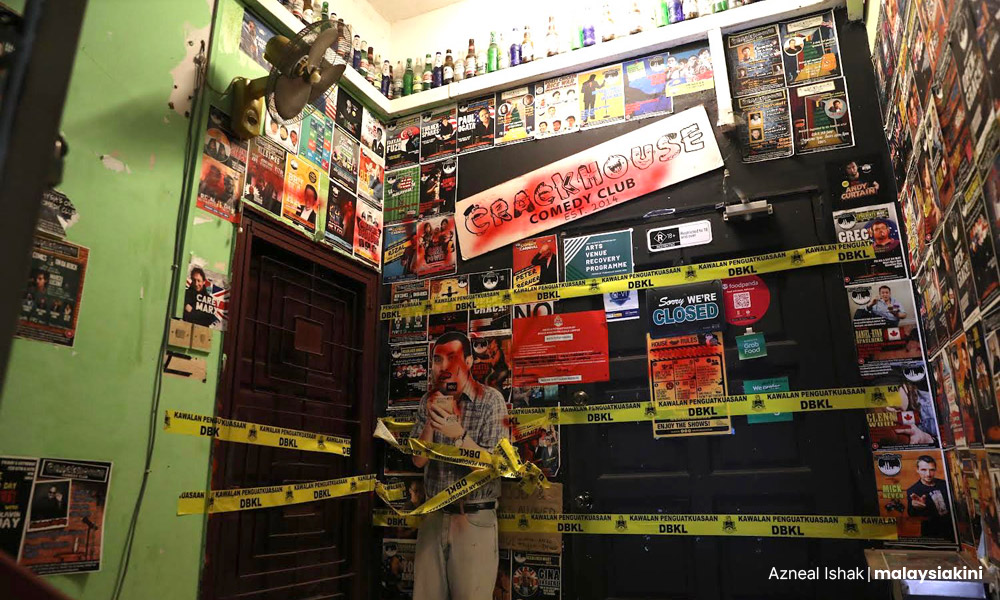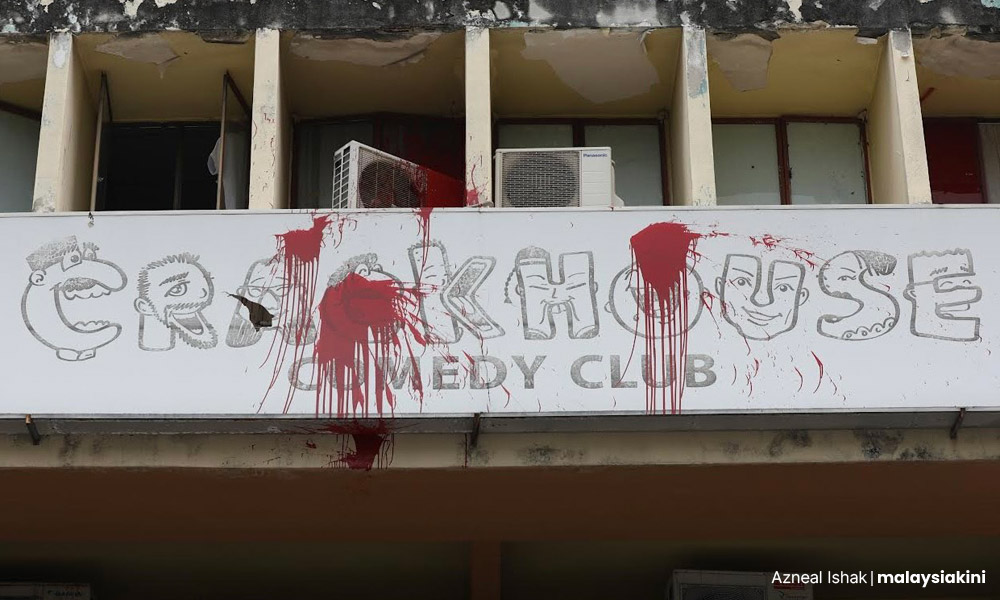
Comedy club owners take govt to court to quash business blacklist
The two owners of Crackhouse Comedy Club have turned to the civil court to overturn Kuala Lumpur City Hall’s (DBKL) permanent ban against them from registering any business in the capital and to reinstate the club’s business licence.
Mohamad Rizal Johan Van Geyzel and Shankar R Santhiram’s judicial review came on the heels of a controversial stand-up routine at the club in Taman Tun Dr Ismail, Kuala Lumpur, in the middle of last year.
The woman who was alleged to be behind the stand-up routine, Siti Nuramira Abdullah, and her boyfriend, Alexander Navin Vijayachandran, are currently facing ongoing criminal court cases involving the performance.

Alexander Navin Vijayachandran (left) and Siti Nuramira Abdullah
Rizal and Shankar’s counsel Harshaan Zamani told Malaysiakini recently that the judicial review leave application was filed at the High Court in Kuala Lumpur in November 2022.
On Aug 18 last year, Rizal and Shankar sent a letter of demand to Kuala Lumpur Mayor Mahadi Che Ngah over media reports on the club’s licence being revoked, in addition to the owners being placed on a permanent blacklist.
Berita Harian then had reported the then deputy federal territories minister, Jalaluddin Alias, as saying that Rizal was permanently blacklisted and the DBKL’s licensing committee had decided to revoke the comedy club’s licence, effective July 30 last year (both actions are herewith known as “the decisions”).
According to a copy of the judicial review filed on Nov 27 and sighted by Malaysiakini, the comedy club owners named DBKL, Mahadi, Jalaluddin, the then Federal Territories Ministry (it has since been absorbed into the Prime Minister’s Department), and the government as the first, second, third, fourth and fifth respondents.
‘Illegal, unreasonable, irrational’
Rizal and Shankar are seeking several court declarations, including that DBKL’s decision to terminate Crackhouse Comedy Club’s business licence and to bar the duo from ever registering any further business in Kuala Lumpur is “illegal, unreasonable, irrational, invalid, unconstitutional and of no effect”.
The duo are also seeking exemplary and aggravated damages from the five respondents.
Rizal and Shankar’s counsel Harshaan Zamani told Malaysiakini recently that the judicial review leave application was filed at the High Court in Kuala Lumpur in November 2022.
On Aug 18 last year, Rizal and Shankar sent a letter of demand to Kuala Lumpur Mayor Mahadi Che Ngah over media reports on the club’s licence being revoked, in addition to the owners being placed on a permanent blacklist.
Berita Harian then had reported the then deputy federal territories minister, Jalaluddin Alias, as saying that Rizal was permanently blacklisted and the DBKL’s licensing committee had decided to revoke the comedy club’s licence, effective July 30 last year (both actions are herewith known as “the decisions”).
According to a copy of the judicial review filed on Nov 27 and sighted by Malaysiakini, the comedy club owners named DBKL, Mahadi, Jalaluddin, the then Federal Territories Ministry (it has since been absorbed into the Prime Minister’s Department), and the government as the first, second, third, fourth and fifth respondents.
‘Illegal, unreasonable, irrational’
Rizal and Shankar are seeking several court declarations, including that DBKL’s decision to terminate Crackhouse Comedy Club’s business licence and to bar the duo from ever registering any further business in Kuala Lumpur is “illegal, unreasonable, irrational, invalid, unconstitutional and of no effect”.
The duo are also seeking exemplary and aggravated damages from the five respondents.

According to a copy of Rizal’s affidavit in support of the judicial review, he claimed that the respondents have abused their power and/or exercised their power arbitrarily.
He contended that the respondents have no basis behind the decisions, which he said are unfair and disproportionate to the purpose of the decisions and that he, as well as Shankar, were not given the opportunity to be heard before the decisions were made.
“I (and the second applicant) have been operating the comedy club since 2013 until the date of the decisions, without any problems or obstructions from any quarter, including the respondents.
“However, the decisions have prevented me (and the second applicant) from continuing the operation of the comedy club in a valid and licensed manner in Kuala Lumpur.
“I respectfully state that the decisions of the respondents have severely/seriously jeopardised my (as well as the second applicant’s) position and interest as the owners of the comedy club and as an entrepreneur due to the decisions having directly barred me from carrying out my business as an entrepreneur in Kuala Lumpur permanently,” Rizal said.
In his affidavit, Rizal said that he is the sole breadwinner of his family and the decisions have severely/seriously jeopardised his family’s life as well.
“I also state that the decisions would also jeopardise my interest (and that of the second applicant) and/or cause improper hardship to me (and the second applicant) in terms of travel/business costs in light of me (and the second applicant) being forced to go to another city, aside from Kuala Lumpur, to carry out any valid and licensed business activities,” Rizal said.

Shankar’s own affidavit supported similar contentions as that put forth by Rizal’s.
According to a copy of the affidavit of service, the cause papers have been served on all five respondents on Dec 30 last year.
When contacted by Malaysiakini recently, the government’s legal representative, senior federal counsel Ahmad Hanir Hambaly @ Arwi, said that the judicial review leave application is fixed for hearing on Jan 26, before the High Court in Kuala Lumpur.
If the civil court grants leave, then it would later set a separate date to hear oral submissions from opposing parties over the merits of the judicial review proper.
The Permanent Blacklist is a clear administrative overreach by DBKL.
ReplyDeleteRegardless what was the supposed wrong-doing, such a severe penalty can only be imposed by a Court, after proper prosecution has argued its case evidence, subject to due legal appeals process, not by administrative fiat.